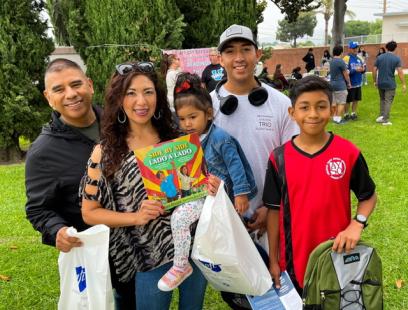For Lilia Carreon, president of the El Rancho Federation of Teachers, giving away hundreds of backpacks and Spanish and bilingual books to kids is about more than literacy, more than sparking a love of reading, and even more than finding joy on the page of the book.
“I love doing this because kids are really talking to their parents; families are really connecting,” she says. “I’ve seen the impact of having books—it’s the talking and the excitement, it’s the parents and students and board members that show up to volunteer. It’s the community and the connection.”
Carreon and ERFT hosted a community-wide book fair in conjunction with their partners, the California Federation of Teachers, the El Rancho Unified School District, the Labor Council for Latin American Advancement – Los Angeles, NALEO Education Fund, and El Rescate, on September 16 to kick off Hispanic Heritage Month. The event was part of AFT’s Reading Opens the World program, which has distributed more than 1.5 million books and hosted more than 250 events across the country since its launch in December 2021. They also hosted a citizenship information session, which breaks down barriers to naturalization with free legal advice.
Both events, Carreon says, are transformative for entire families.
“The citizenship clinics are so valuable and so needed. When people walk in, they look nervous and when they walk out, there’s a sense of, ‘I think I can do this,’” she says. “And families started lining up for the book fair an hour and a half early. We ran out of books two hours into a four-hour event. Families that weren’t able to get books kept asking us when we were going to this again and when we were going to come to their neighborhoods.”
ERFT hosted the event in Pico Rivera, a largely Latino community. The bilingual and Spanish books are critical, Carreon says, because that is what families need.
“When I look around at these book events, I see the most amazing thing,” she says. “No one is on their cell phone. No one is staring at a screen; they are all talking to each other and engaged with each other. We missed that so much during the pandemic, and kids need that connection. We all do.”
Carreon, who teaches high school history, says that the connections are what make getting through the tough times a little easier.
“It can be hard, because you’re fighting battles about teaching honest history and keeping books in libraries, but these events remind me of why we do this,” she says. “There is such a deep sense of humanity in a community, and if we just tap into it, we can lift each other up.”
[Melanie Boyer]

